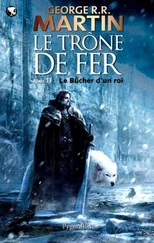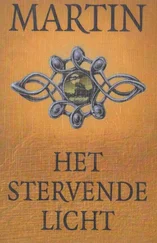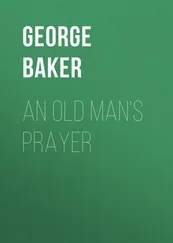But that was not to be.
Quohog was the first man to sight the doomed ship, and his barbaric yawp sounded down from the crow’s nest. In his accent, one of the oddest I have heard in the widely traveled Carib, the call of Ship ahoy! sounded more Zeeah loy and his further report of smoke as Awch . For those of us who had shipped with him, there could be no doubt as to the meaning of his garble, but as to the intent of it, I believe we all hesitated. Quohog had a well-earned reputation as a man who enjoyed a good joke, and none of us, myself included, would have been surprised if he had invented the sighting for the sheer joy of looking down at the deck and watching us scatter. So it was that I made no order to change our sail until I could, with spyglass in hand, climb aloft and confirm the existence of this improbable ship.
She was a merchant fluyt, that was clear, and she rode low in the water. Sails once proud hung ragged from her arms, and smoke rose from her. The gunports were open, and her half dozen cannon stood openmouthed and unmanned. She flew the tattered flag of Denmark, and her rail and sides were splintered and burned. In retrospect, I believe it was the burning that led me astray, for I had seen the leavings of many battles at sea, and I had never seen scorching of that kind from a weapon of man. I assumed instead that I was looking upon a lightning-struck ship that had through ill chance or malice been caught in the open sea during the tempest just passed. Such easy prizes were rare but not unheard of, and with pleasure at our good fortune, I called the man at the wheel to turn us in pursuit.
I can recall still the slow movement of the derelict from a pinpoint on the horizon to a mass of black no larger than a coin held at arm’s length. Her masts took shape even without the aid of a glass, and then as if between one breath and the next we were upon her. Close, the extent of the damage she had suffered became clear. The black char along her sides had reduced her higher planks to coal, and rough holes punctured her flesh. I had no doubt that she rode low not from the weight of her cargo but because she was taking on water. The smoke that rose from her was the pale white of great heat, and as we came alongside, my only fear was that the fire might reach whatever magazine the merchant possessed and detonate her powder while we were near enough to be harmed. The name on her counter was Vargud van Haarlem . I prided myself on knowing the waters where I plied my trade, and I had never heard of her. That alone should have been warning, but I was rash and, worse, curious. I ordered her boarded, gave command to my first mate Mister Kopler, and crossed to her ruined deck myself.
Upon my arrival, the first thing to command my attention were the bodies of the dead. Many were sailors in the rough canvas as common to ships of the line as to merchants or pirates, but several wore the uniforms of soldiers of the colonial guard. And among them were strange, jointed objects like nothing so much as the legs of massive crabs as thick as a strong man’s thigh and as long as my own body. I instructed my men to step lightly and be ready to flee back to the Dominic , but I hardly needed to bother. I say without shame that there was something eerie about the Vargud , and I walked her decks mindful of tales of the Flying Dutchman and of plague ships that ride the ocean currents long after the crews have died. Her quarterdeck burned with a forgelike heat, but the pale flames remained oddly fixed. The sails were not of canvas, but an odd mineral weave that the heat would not consume. At the helm, the burned remains of a man stood, hands fused to the wheel. As I paused there trying to imagine what unholy conflagration could leave such damage behind it, the voice of my third mate, Mister Darrow, called out to me.
Mister Darrow was a New Englander, and though some may be his equal in seamanship, there has never been born into this world a man more laconic. To hear the alarm in his voice chilled me to the bone. I recall his precise words. Captain Lawton, you’re needed in the hold . Seeing them written here, they seem prosaic, but I assure Your Majesty that at the time they seemed a cry from Hell. I drew my pistols and ducked belowdecks, prepared, so I believed, to find anything.
I was mistaken.
To those accustomed to the hold of a ship of the line, the belly of a fluyt is an improbable thing. They are large and robust, fit to fill with crates enough to make the journey between old world and new yield a profit. In the vast interior darkness of this ship, I found only a half dozen of my own men and two things more: a pallet stacked as high as my waist with gold in the shapes and designs I had come to know as Incan, and a woman standing before it, sword in one hand, pistol in the other, and soaked by her own blood.
Looking back upon the moment, there cannot have been so much light as I remember, but I swear to you I saw her in that dimness as clear as in full day. She stood half a head taller even than myself, and I am not a small man. Her skin was the color and smoothness of chocolate and milk, her hair only half a shade darker. She wore a man’s trousers and a brocade jacket any gentleman of court would have been proud of, though it was cut to her figure. Her eyes were the gold of a lion’s pelt, and the lion’s fierceness also set the angle of her jaw.
I saw at once that she was grievously injured, but she blocked the path to the treasure with her body and would let no man pass. Indeed, as I stepped in, she shifted the barrel of her pistol neatly to my forehead, and I had no doubt that the slightest movement of her finger would end my life. Mister Darrow knelt on the deck, a junior crewman called Carter lying at his feet, hand to his shoulder.
“What’s this, then?” I asked.
“Mine,” the woman said. “What you see here is mine, and you will not have it without slaughtering me as you have my people.”
“I’ve slaughtered no one, miss,” I said, amending myself with, “or at least no one here. I am Captain Alexander Lawton.”
“Lawton?” she said, and I thought a flicker of recognition touched her expression. “The same who stood against Governor Smith?”
“And lost,” I said, making a joke of it. “I am the same.”
“Then you are the answer to my prayer,” she said. “You must return me to my ship.”
Darrow cast a glance toward me, and I shared his thought. Her wounds had no doubt rendered her subject to delusion, for we stood within her ship even as she asked to be returned to it.
“Put down your weapons, and I will do what I can,” I said. Her pistol did not waver.
“Give me your word of honor.”
Your Majesty, I find myself hard-pressed to describe the emotions that arose in me with those words. She stood outnumbered and outgunned, and she did not beg. Her words were not a request, but a demand. For years, my word of honor had been hardly worth the breath it took to speak it, and yet she insisted upon it as if it were a thing of value.
“I cannot offer what I do not have,” I said. “But I promise you will come to no harm.”
Her expression grew serious. She lowered her pistol, and as if continuing the same motion, crumpled to the deck. It was all that I could do to kneel in time to break her fall.
“Carter’s hurt,” Mister Darrow said. “Tried to part the miss there from her gold.”
“Seemed the right thing,” young Carter said.
“Will you live?” I asked, lifting the unconscious woman up.
“Will or won’t, sir,” Carter said. “Either way, crossing her’s a mistake I’ll not make twice.”
I left Mister Darrow in possession of the burning ship and transported the woman of whose name I was still ignorant to the Dominic and Doctor Koch. Your Majesty is perhaps aware of Doctor Koch’s somewhat unsavory reputation, and I cannot claim that it is undeserved, for we were unsavory men, but when I appeared at his cabin with an unfamiliar and unconscious woman in my arms, I can truthfully report that his oath as a man of healing lent him an expression of concern better fitted to a mother dog nuzzling her injured pup. He bade me leave her with him to have her hurts attended, and swore that he would call for me as soon as she came to herself. It was not a promise that he kept, but given the circumstances, I cannot hold the fault against him.
Читать дальше












